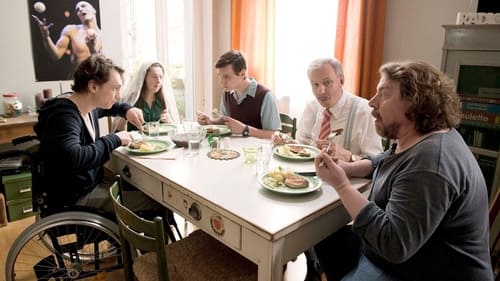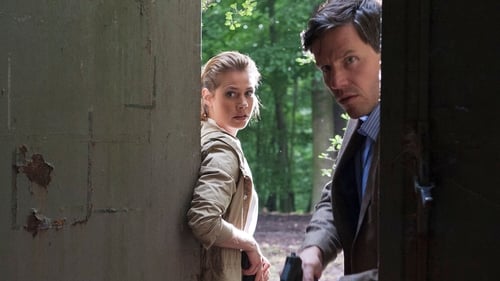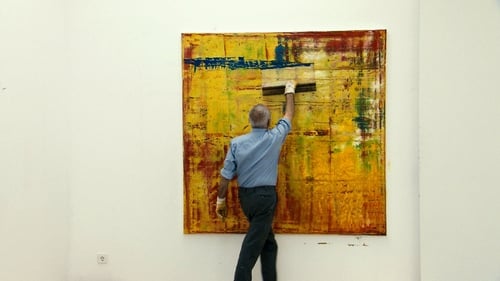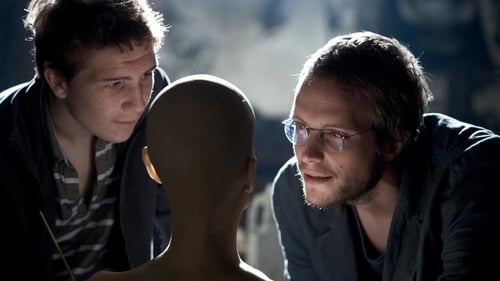Johann Feindt
Birth : 1951-03-16, Hamburg, Germany

Cinematography
An artistic audiovisual project emanating from the economic and social confusion that first emerged in recent years between Germany and Greece and now is spreading throughout Europe and the rest of the world. The two countries are presented here as examples, representative of the differences and conflicts that are exacerbated by a crisis.

Director of Photography
Nardos, an Azmari singer from Addis Ababa, dreams of telling stories about the lives of ordinary people through her music. In her search for the stories behind her songs, she meets Gennet, a poet who lives on the streets with her children. Nardos puts the lives, visions and power of Ethiopian women at the center of her creation as we slowly immerse ourselves in a rapidly changing country.

Director of Photography
"A Woman" is a cinematic essay about identity. A search into the wounds of exile and a reflection on the function of memory. A haunting and intimate portrait of the director’s own mother. It is the story of an imitation artist, trying to adapt to the challenges of real life … as a woman.

Director of Photography
Thomas Brasch was born as a German-Jewish emigrant in England in order to move to the young GDR with his family at the beginning of the 1950s. His father Horst is primarily interested in helping to build the new German state. But Thomas prefers to realize himself as a writer and in doing so discovers his potential as a poetic rebel. His very first play was banned and soon afterwards he lost his place at the film school. When the tanks of the Soviet Union roll through the Czech capital Prague in 1968, Brasch and his girlfriend Sanda and other students try to call for protest in the streets of Berlin - and fail. His own father betrays him to the Stasi and allows Thomas to go to prison. After being paroled, he continues to try his hand at poet writing about love, revolt and death. In the GDR, however, you don't want to have anything to do with someone like him.

Director of Photography
Artificial Intelligence is already changing almost every area of life today. This documentary essay is inspired by the changes that influence our perception of Topos. By combining film images, graphics with documentary text modules, the author associatively points out how the progress of data and technology colonizes human existence and fundamentally influences the balance between the psychological, mental, and biological aspects of life.

Camera Operator
Sven Marquardt might be the most famous bouncer worldwide. But beside standing in front of the legendary techno club Berghain in Berlin, he is also a well-known and skilled photographer. Long before the Berlin Wall came down, Marquardt portrayed the subcultural East-Berlin scene. His black and white photography illustrates it as voluptuous, laid-back, dirty and existential. Even if shot by daylight, his work is permeated by darkness, ecstasy and night.

Director of Photography
Paul Bacher is in crisis. If he could feel in the past as one of the most influential writers of his generation, he has long lacked ideas and impetus for a new great work. His reading tours are becoming more and more a sad affair with too much alcohol and too little public. Then Paul overflows in a drunken hitchhiker, flees first scared and later removes the body, without talking to anyone about the experience. But something is flowing in its interior. Paul starts to write again. The criticism is done, but the story about the death of a hitchhiker also arouses suspicion.

Camera Operator
Newlyweds Hedda and Jorgen Tesman are just returning from their honeymoon to a villa by the edge of the forest with a breathtaking view on the city. Restoration work on their home has not yet been completed, and Jorgen will soon be running out of money. That's if he doesn't succeed Dr. Franck Brack as head physician of the city hospital. Jorgen and Hedda prepare dinner for Brack, when two uninvited guests emerge. As the evening progesses the group becomes entangled in a weave of guilt, love and betrayal and when morning comes disaster has struck.

Cinematography
Nina, Edith and Ronald are sexual assistants. Their clients are people with disabilities, their job: to satisfy their desire for physical contact. Is this a form of prostitution? A study of a taboo subject.

Director of Photography
What do Dietrich Oepke, former GDR model plane champion, Dave Anthony, developer of “Call of Duty” and James Gimzewski, Professor of Nanoarchitecture have in common? They are all players. Concrete or virtual, with quadcopters, futuristic weapons or experiments with an artificial brain, they play with human and technical possibilities. How real are their visions of the future? What do they have in common with developers of unmanned war machines and drone pilots? A cinematic journey.

Director of Photography
It all started with a small exercise book. Its page were checkered with the courageous testimonies of 300 Central African women, girls and men. They reveal what Congolese mercenaries did to them. On their own initiative, they gathered together their testimonies in this book.

Camera Operator

Camera Operator
With the search for her roots her constant companion, actress Adriana Altaras goes on a journey to find a country which no longer exists - and along the way discovers a whole lot more.

Writer
1942, and a spectacular wartime birth in the depths of winter: a young russian nurse unexpectedly goes into labour and, all alone and in freezing temperatures, gives birth to her daughter Tamara in a field on the banks of the Volga. The most personal film to date from co-directors Tamara Trampe and Johann Feindt is dedicated to Tamara's own family history. The search for her unknown father who, as a russian officer, made the young nurse pregnant, is complicated by the fact that her mother has never come to terms with her wartime trauma and worn family photos only seem to show happy-go-lucky life before the war. But the director won't give up so easily and, through a mixture of personal childhood recollections and conversations with relatives and former nurses who were on the front in Ukraine, she puts together the pieces of the puzzle.

Director
1942, and a spectacular wartime birth in the depths of winter: a young russian nurse unexpectedly goes into labour and, all alone and in freezing temperatures, gives birth to her daughter Tamara in a field on the banks of the Volga. The most personal film to date from co-directors Tamara Trampe and Johann Feindt is dedicated to Tamara's own family history. The search for her unknown father who, as a russian officer, made the young nurse pregnant, is complicated by the fact that her mother has never come to terms with her wartime trauma and worn family photos only seem to show happy-go-lucky life before the war. But the director won't give up so easily and, through a mixture of personal childhood recollections and conversations with relatives and former nurses who were on the front in Ukraine, she puts together the pieces of the puzzle.

Director of Photography
1942, and a spectacular wartime birth in the depths of winter: a young russian nurse unexpectedly goes into labour and, all alone and in freezing temperatures, gives birth to her daughter Tamara in a field on the banks of the Volga. The most personal film to date from co-directors Tamara Trampe and Johann Feindt is dedicated to Tamara's own family history. The search for her unknown father who, as a russian officer, made the young nurse pregnant, is complicated by the fact that her mother has never come to terms with her wartime trauma and worn family photos only seem to show happy-go-lucky life before the war. But the director won't give up so easily and, through a mixture of personal childhood recollections and conversations with relatives and former nurses who were on the front in Ukraine, she puts together the pieces of the puzzle.

Director of Photography
Again, the unemployed zookeeper Günther and the discarded salesman Wolfgang are looking for their great luck. Therefore, they get the help of a young man who, due to his autism, has extraordinary skills at the roulette table.

Camera Supervisor

Director of Photography

Director of Photography
Gerhard Richter has spent over half a century experimenting with a tremendous range of techniques and ideas, addressing historical crises and mass media representation alongside explorations of chance procedures. This first glimpse inside his studio in decades is exactly that: a thrilling document of the 79-year-old's creative process, juxtaposed with rare archival footage and intimate conversations with his critics and collaborators.

Director of Photography

Director of Photography
Lullabies are our first connection to the world – a universal experience we all share, yet it remains deeply personal. "Can you recall a song that your mother would sing for you to fall asleep?" is the question Tamara Trampe and Johann Feindt ask people they meet in the streets of Berlin.

Writer
Lullabies are our first connection to the world – a universal experience we all share, yet it remains deeply personal. "Can you recall a song that your mother would sing for you to fall asleep?" is the question Tamara Trampe and Johann Feindt ask people they meet in the streets of Berlin.

Director
Lullabies are our first connection to the world – a universal experience we all share, yet it remains deeply personal. "Can you recall a song that your mother would sing for you to fall asleep?" is the question Tamara Trampe and Johann Feindt ask people they meet in the streets of Berlin.

Director of Photography

Director of Photography
An inspiring and provoking road trip through Germany between 2006 and 2009.

Director of Photography

Director of Photography
Something terrible is about to happen in a small town in Germany. Nobody knows the reason why, except one person: Rico Bartsch. The 15-year old grammar school pupil, an absolute outsider, is in love with the most beautiful girl at his school. What in the beginning is a longing that can never be fulfilled will come true at the end of the story. Beautiful Regine will beg for Rico’s love. Until then several inhabitants of the town will die an unnatural death...

Director of Photography
Documentary about the war in Chechnya.

Writer
Documentary about the war in Chechnya.

Director
Documentary about the war in Chechnya.

Director of Photography
Benjamin Levi (Bruno Cathomas) is a Bavarian cattle dealer traveling to pre-World War II Germany on his annual trip to a remote farming village. Levi hopes to do some business and, more importantly, win the hand of the lovely Lisbeth (Caroline Ebner). But Nazi propaganda has gripped the small community and poisoned it forever. Now, Levi and Lisbeth are targets of hate in this provocative and shocking drama.

Director
Documentary film.

Director of Photography
A group of young people draws straws to see who'll steal some cigarettes. With this theft, Sebastian starts a bizarre, symbolic odyssey through a sclerotic world, in search of himself and of truth and justice. When he tries withdrawing from one social paradigm, he finds himself caught in another.

Director of Photography

Writer

Director

Director of Photography
In 1970, Melek Tez came to Berlin as a young worker from Turkey. A confident woman, she first countered racist resentments and remarks with irony and wit. Jokingly, she even referred to herself as a "Kümmeltürkin", a derogatory German term for Turkish migrants. Yet after fourteen humiliating years, her fighting spirit has given way to resignation: Melek Tez is returning to Turkey. Blending documentary, interviews and re-enacted scenes, director Jeanine Meerapfel chronicles Melek Tez' life experience.

Director
Documentary about the Urban Hospital in Berlin.

Director
This film examines two parallel German lives: that of a Nazi general who continued in his job during the democratic era and a communist bricklayer who could hardly make ends meet after the war. Both had fought in the Spanish Civil War, but their stories can’t be merged; the audience gazes into a wound that will not heal.
























